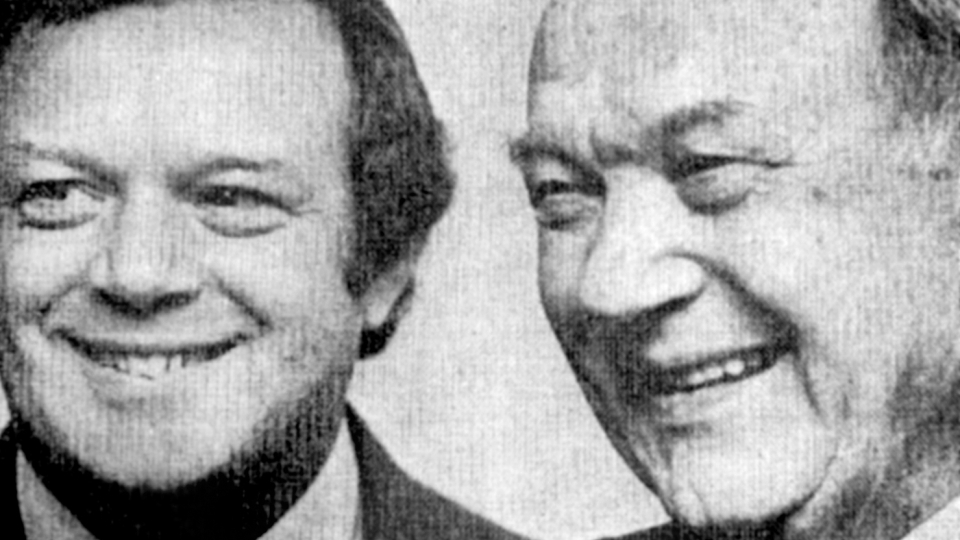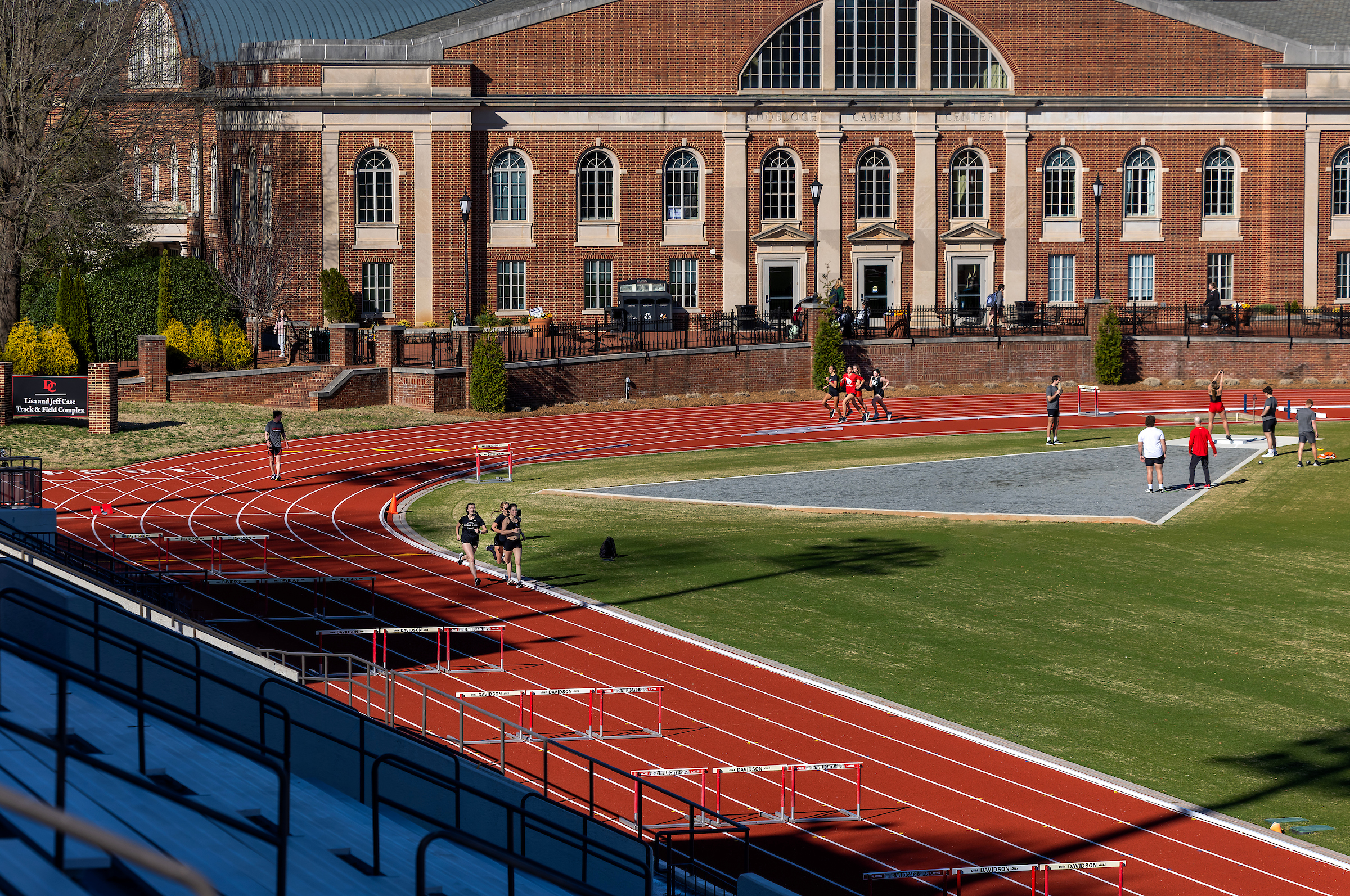From Soviet Collapse to Syrian Civil War: Diplomats to Offer First-Hand Accounts of History
February 7, 2020
- Author
- Mary Elizabeth DeAngelis

David and Dean Rusk
When David Rusk became the mayor of Albuquerque, New Mexico, his father presented him with a list scrawled on a piece of hotel stationary.
The “30 Helpful Hints for New Mayors” list became a guide that Rusk carried with him through a life in public service. He’ll talk about it—and his father’s legacy—with students, faculty and the community when he visits Davidson College this month.
The late Secretary of State Dean Rusk ’31 topped his list with this: Integrity.
“Public service, whether appointed or elected, is an honorable calling,” David Rusk said. “It is a public trust, and public servants are there to serve the public, not enrich themselves.”
David Rusk is the first speaker in this year’s Bank of America/Dean Rusk Lecture Series, which features diplomats and global citizens with first-hand perspectives of events that shaped the modern world. The college’s Dean Rusk International Studies Program hosts the series.
Triumphs and Setbacks
Diplomats don’t usually dominate news cycles. They typically work out of the spotlight, promoting relationships with America’s allies to protect the country’s interests at home and abroad.
When imminent threats and conflicts arise, so do their profiles. That’s when you’ll see them testifying before Congress, shuttling fellow citizens away from an uprising abroad, or under siege in an embassy.
The speakers coming to Davidson have stories to tell. Their experiences are awash in international relevance and they’ll offer insight into some of the biggest issues around the globe.
Collectively, they’ve witnessed the collapse of the Soviet Union; the shaping of modern Russia and its war with Ukraine; and two wars in Iraq.
A married diplomatic couple and their children holed up in an underground bunker during unrest in the former Soviet Union. Another survived an embassy bombing and witnessed the horror of Rwanda genocide.
Some of the visitors will speak with students and faculty, but not hold public lectures.
A Pulitzer Center photojournalist will share his work documenting the Kurds in Syria and Iraq. A Cuban poet whose parents were Holocaust survivors will spend a month in residence.
“Each of these speakers has written about their careers and the triumphs and setbacks they experienced along the way,” said Jane Zimmerman, John and Ruth McGee Director of the Dean Rusk International Studies program. “They talk about the tough choices that in some cases still haunt them.”
Legacy & Influence
David Rusk comes with experience in public service and as a witness to his father’s influence on the world. “Pop” also influenced David Rusk’s best childhood friend, Richard Holbrooke, who served twice as an assistant secretary of state, and as Ambassador to Germany and then the United Nations.
Rusk will speak to Zimmerman’s political science class about both his father and Holbrooke, who spent a lot of time with the Rusks as a teenager. He’ll also meet with Chidsey Fellows and Assistant Professor of Political Science Katherine Bersch’s “Comparative Public Policy” class. His public lecture is at 7 p.m., Feb. 12, in Hance Auditorium, Chambers Building.
Dean Rusk served as U.S. Secretary of State under Presidents John F. Kennedy and Lyndon B. Johnson; most visibly during the Vietnam War, which made him a target of criticism and protests.
“In Vietnam the decisive issue was the fidelity of the United States to collective security and its treaty commitments and the implications of the fidelity for world peace,” Sec. Rusk later said.
Toward the end of his life, he co-authored a book, As I Saw It, with his other son, Richard Rusk.
“You know my whole life wasn’t defined by Vietnam,” he told Richard during one of their interviews.
David Rusk wants to talk about other aspects of his father’s life.
After graduating from Davidson, Sec. Rusk was a Rhodes Scholar at Oxford University and studied at the University of Berlin. He saw the rise of Hitler and worked in the U.S. War Department when Japanese bombers attacked Pearl Harbor.
David Rusk was 10-years old and reading the newspaper comics at his family’s apartment in Alexandria, Virginia, one Sunday morning when his father rushed down the stairs in a suit and headed out the door.
“He told me that North Korea had just invaded South Korea,” David Rusk said.
That started the Korean War and shortly after the invasion, American soldiers deployed to defend non-communist South Korea.
Sec. Rusk’s diplomatic skills helped avert the Cuban Missile Crisis in 1962. During the standoff, State Department security officers lived in the family’s basement.
He also served as president of the Rockefeller Foundation. He worked with emerging countries to develop new varieties of corn, wheat and rice, promote sustainable farming, improve water supplies and educate their leaders in American universities, David Rusk said.
“Part of my intent is to broaden people’s knowledge of history, and Pop’s role in it,” he said. “There was far more to his life and legacy than Vietnam.”
Before You Attend An Event
Please check the Events Calendar for schedule changes and cancellations.
Upcoming Lectures
Bank of America Lecture with David Rusk
Public lecture: 7 pm, Feb. 12, Hance Auditorium, Chambers Building
David Rusk will reflect upon the career and legacy of his father, former US Secretary of State Dean Rusk '31, and the impact on his family of a “life of leadership and service.” David Rusk has also had a distinguished public service career, as mayor of Albuquerque, New Mexico, a state legislator, senior official and policymaker in the US Department of Labor, civil rights activist, and expert on urban development and economic opportunity.
U.S. Ambassador Charles Ray
Public lecture: 7 p.m., Feb. 17, Nancy O. Blackwell House (Alumni House)
Charles Ray, former U.S. ambassador to Cambodia and Zimbabwe, deputy assistant secretary of defense for POW/missing personnel affairs, and Vietnam War veteran, will discuss his experiences and leadership principles. Ray is a prolific essayist, poet, artist and author of many works of fiction and nonfiction, including a historical series about the Buffalo Soldiers, the African-American soldiers who served on the western frontier.
U.S. Ambassadors Nancy and James Pettit
Public lecture: 7 p.m., Feb. 24, Hance Auditorium, Chambers Building
Nancy Pettit recently retired from a long and distinguished career as a Foreign Service Officer and expert on Russia and the former Soviet Union after serving as U.S. ambassador to Latvia. James Pettit served as U.S. ambassador to Moldova, and also has extensive experience and expertise in Russia, the former Soviet Union, and East Asia. They witnessed firsthand the collapse of the Soviet Union and the events and policies which shaped modern Russia and its relations with its neighbors and the United States.
U.S. Ambassador Prudence Bushnell
Public lecture: 7 p.m., March 10, Hance Auditorium, Chambers Building
Prudence Bushnell is the author of Terrorism, Betrayal, and Resilience: My Story of the 1998 U.S. Embassy Bombings. U.S. Secretary of State Colin Powell appointed her as the first Dean of the School of Leadership and Management at the State Department’s Foreign Service Institute. In addition to serving as U.S. ambassador to Kenya during the bombing of the U.S. embassy in 1998, Bushnell was deputy assistant secretary of state for Africa during the Rwanda genocide. She also served as U.S. ambassador to Guatemala.
U.S. Ambassador Linda Thomas-Greenfield
Public lecture: 7 p.m., March 16, Hance Auditorium, Chambers Building
Linda Thomas-Greenfield, former director-general of the Foreign Service, assistant secretary of African Affairs, and ambassador to Liberia, will discuss how women and girls are increasingly powerful agents of change throughout Africa during her keynote lecture. Thomas-Greenfield has shared her experiences during the Rwanda genocide and how she found strength and compassion through her adversity in her Ted Talk.
U.S. Ambassador William Burns
Public lecture: 7 p.m., March 18, Hance Auditorium, Chambers Building
William J. Burns is the President of the Carnegie Endowment for International Peace. His recent memoir, The Back Channel: A Memoir of American Diplomacy and the Case for Its Renewal, recounts his career as a Foreign Service officer, including serving as deputy secretary of state, undersecretary of political affairs, assistant secretary of near East affairs, and U.S. ambassador to Russia and Jordan.
Judy Heumann
Public lecture: 7 p.m. March 19, Hance Auditorium, Chambers Building
Judy Heumann is a distinguished international disabilities rights activist. Pending approval from Netflix and the Obamas’ production company, Higher Ground, Heumann may show and discuss the new documentary, Crip Camp, in which she is profiled and which will be premiered at the Sundance Film Festival. Heumann’s pioneering work on disabilities rights at home and abroad is also the subject of several other documentary films, including The Power of 504, Lives Worth Living, a Ted Talk, and an episode of Drunk History. On Feb. 25, Heumann's memoir will be published—Being Heumann: An Unrepentant Memoir of a Disability Rights Activist.
U.S. Diplomat Ron Capps
Public lecture: 7 p.m., March 24, Tyler-Tallman Hall, Sloan Music Building
Ron Capps, former U.S. diplomat, U.S. Army officer, and founder of the Veterans Writing Project, will share his groundbreaking work through writing, music, and the arts to help veterans and their families manage post-traumatic stress syndrome. A prolific writer, Capps is the author of Seriously Not All Right: Five Wars in Ten Years.


